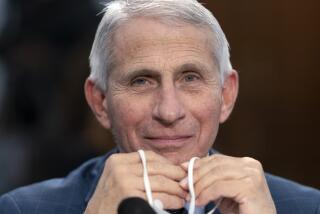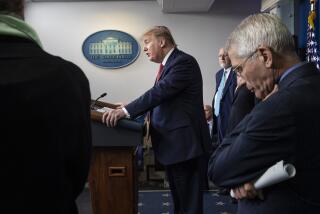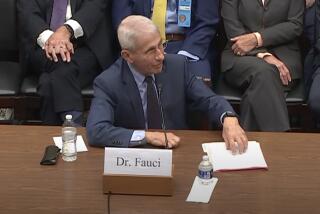Contradicting Trump, Fauci says there is no order or plan to slow down COVID-19 testing
- Share via
WASHINGTON — Dr. Anthony Fauci and other top government officials fighting the COVID-19 pandemic said Tuesday they had not been ordered to slow down testing for the disease, despite President Trump’s insistence hours earlier that he was not kidding when he said he directed them to back off.
“To my knowledge, none of us have ever been told to slow down on testing,” Fauci said in testimony before the House Energy and Commerce Committee. “That is just a fact.”
He said testing would continue, and be accelerated.
The three other officials testifying Tuesday — Centers for Disease Control and Prevention Director Robert Redfield, Food and Drug Administration Commissioner Stephen Hahn, and Health and Human Services Assistant Secretary Brett Giroir — said they had not received such a slow-down order either.
Earlier Tuesday morning, Trump reiterated that he had directed his administration to slow testing, a claim he first made during a campaign rally in Tulsa, Okla., on Saturday. Trump has complained that increased testing in the U.S. is inflating the number of reported cases compared with other nations.
After the rally, several administration officials claimed Trump was kidding and his comments were clearly a joke.
“I don’t kid,” Trump said Tuesday when asked whether he was serious.
Fauci, a member of the White House Coronavirus Task Force since January, called the current virus response a “mixed bag,” with some parts of the country improving, such as the former epicenter of COVID-19, New York City.
But he added: “In other areas of the country, we now see a disturbing surge of infections,” attributing the rise to “an increase of community spread.”
In particular, Fauci pointed to rising case counts in Florida, Texas, and Arizona — three states with governors intent on reopening.
“The next couple of weeks are going to be critical in our ability to address those surges,” he said.
Under questioning from Rep. Bobby L. Rush (D-Ill.), Fauci acknowledged that institutional racism was a factor in the virus’ disproportionate effect on Black communities.
“Obviously the African American community has suffered from racism for a very, very long period of time, and I cannot imagine that that has not contributed to the conditions that they find themselves in economically and otherwise,” Fauci said.
He said Black Americans are more likely to have jobs that put them at higher risk for COVID-19, and more likely to suffer from chronic health conditions that make them more susceptible to infection.
“Unfortunately, we have a situation where it’s sort of a double whammy of a negative capability of them to respond, through no fault of their own.”
Redfield updated the committee on the CDC’s efforts to mandate reporting of race and ethnicity data for all coronavirus patients, which began May 8.
“Reporting from hospital surveillance sites has increased in completeness from 30% to now more than 80%,” Redfield said in his opening statement.
Fauci, who has served under six presidents as the director of the National Institute of Allergy and Infectious Diseases, has been notably absent from public briefings for weeks. On May 15, the Trump administration announced that the task force would pivot to a new phase of “getting Americans back to work and allowing businesses to reopen,” adding five new members, including the secretaries of labor and agriculture.
On Friday, White House Press Secretary Kayleigh McEnany announced that members of the task force would no longer be giving press briefings now that the administration was in a “more regular routine” dealing with the virus.
Fauci last testified before Congress six weeks ago, sparring May 12 with Sen. Rand Paul (R.-Ky) over timelines for school reopening.
Some lawmakers Tuesday urged Fauci to adopt a more public role in informing and educating Americans about the ongoing risks.
Others expressed skepticism that a vaccine would be available by early next year.
Fauci said he remained “cautiously optimistic” that a vaccine would be available to the American public “at the end of this calendar year and the beginning of 2021.”
More to Read
Get the L.A. Times Politics newsletter
Deeply reported insights into legislation, politics and policy from Sacramento, Washington and beyond. In your inbox three times per week.
You may occasionally receive promotional content from the Los Angeles Times.










